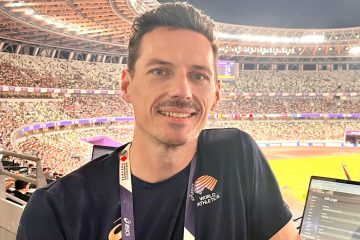21 Questions With… Lee Hurley
In the first of a new series of interviews with those in sports media who are LGBT+, we speak to writer and editor Lee Hurley…

Sports Media LGBT+ began back in August 2017, with a discussion between journalists, editors, media officers, PR professionals and academics. We talked about what it’s like to be lesbian, gay, bisexual or transgender in the industry; explored whether our individual experiences were similar to those of others; and asked what benefits might come for both sport and media from some additional visibility and awareness. Then, in November, the network was launched. Our first year has been about establishing our presence, trying to be as approachable as possible, and reaching out to make connections with other networks. It’s been a really encouraging start, and we’re very grateful to everyone who’s interacted with us and helped us along the way.
Now we’re introducing ’21 Questions With…’ – a new Q&A feature in which we’ll be seeking to learn more about the individuals in our address book who are working in sports media and who are LGBT+. We’ll be asking them about their work, their love of sport, and their careers to date, and questions relating to sexuality and gender identity too.

Lee Hurley is a freelance writer living in Belfast, and the owner / editor of DailyCannon.com, one of the most popular Arsenal fan portals on digital. A Gunners fan for almost 30 years, he began a blog about the club back in 2008, originally titled LadyArse.com. A few years later, as Lee explains in this Mirror article, he began his transition from female to male.
In March 2018, Lee reflected on that journey in a DailyCannon.com article titled ‘From the writer formerly known as LadyArse’…
When I made the decision to transition from female to male, quite a lot changed, as you can imagine. It has been a process that has taken around six years – a little different from the single ‘op’ many people think is required to sort it all out – and at the start of it all, I made the decision to change the name of the site from LadyArse to DailyCannon as I changed my name legally too.
Last year, Lee wrote a series of articles about his experiences as a trans man for Metro. Recently, he has also begun writing opinion columns for The Guardian, and is the author of ‘Transgender: How do you know?’, available on Kindle Books.
On Saturday evening, he gave a speech at Stormont’s Great Hall at the Alternative Queer Ulster meeting, an event designed to give queer voices a platform rarely offered in Northern Ireland. You can read Lee’s powerful speech here.
My legs held. Just. #AltQueerUlster pic.twitter.com/8eFZ9PHs5f
— Lee Hurley (@HLeeHurley) July 28, 2018
Thanks to Lee for giving up the time to answer our 21 Questions. Let’s get started…
1. What does a typical day look like in your job / role?
After years of working 14-16-hour days and feeling the stress of that, I took a long hard look at my life and how I was managing my time. Now, I get up at 5am because I’m annoyingly productive in the morning when the world is asleep, and get started on content for DailyCannon.com. There is another writer who comes on about 9am and by that time, I’m pretty much finished with my content, and back from walking the dog.
Went to get Nova for a walk and this is what I found… pic.twitter.com/oAxtrzvist
— Lee Hurley (@HLeeHurley) June 14, 2018
After that, the rest of the day is usually my own. I’m trying to use that time to work on more in-depth articles and find ways to turn my platform, that’s built around support for Arsenal, into one that can make a difference in LGBTQ+ lives.
2. What’s the most enjoyable aspect of your work?
Being able to do what I want, when I want, has to be the standout.
3. What’s your favourite sporting memory?
It was a crazy final day in the Irish League during the 90s. Two local derbies were being played at the same time, and all four teams could win the league if results went the right way. Imagine Manchester United v Manchester City and Arsenal v Spurs to get a feeling for the rivalry in play that day. My team won their game but there was a delay in the other, so everybody was waiting around for about five minutes, listening to the radio trying to work out what was happening. Suddenly, a large cheer went up from the fans of the team we’d beaten and they started charging back into the ground. A goal had been scored in the other game that had been stuck at 1-1 for ages (the only result that meant we’d win the league) – or so the radio relayed. It was ruled out seconds later and the final whistle went, winning us the league while our fiercest rivals’ fans had to slink from the ground. That it all happened just a few days after a friend of mine from the matches had been shot dead made it all the more poignant.
… And if that’s a little too abstract, how about Arsenal at Anfield in 1989?
4. Who are your top three icons in sport…
Arsene Wenger, Martina Navratilova, Dennis Bergkamp

5. … and why?
Arsene Wenger’s intelligence, knowledge, zen approach to life, poise, elegance and humility see rise him above most others still alive in the sporting world today for me. Watching him work closely for 22 years, even when things were starting to fall apart at Arsenal, it was impossible not to be impressed with the dignity he showed at all times.
Although I’m a trans man now, growing up I identified initially as a lesbian and Martina Navratilova was about the only role model out there that I felt any sort of identification with. Although being gay in women’s tennis is not a big deal, back then it took some serious ova to be Martina Navratilova and I can’t help but admire her for that.
Dennis Bergkamp is the finest player I’ve ever seen live. His approach to the game, attention to detail and the work he put in to fine-tune his talent resulted in a player who is still vastly underrated today in my opinion.
6. What made you want to pursue a career in media?
When I was around 13 or 14, I declared I wanted to be a journalist, after wanting to be a writer since I was about four years old. My school actively discouraged me from pursuing that sort of career, something they needn’t have worried about as I turned out to be quite capable of not pursuing any sort of career all by myself. Despite all that, I always maintained a love for writing, something my grandfather had encouraged in me from the minute I could hold a pencil, getting me to write stories for him.
7. Which people or personalities do you currently look up to in the industry?
In the world of football/Arsenal, I have huge admiration for Amy Lawrence. She’s managed to fight through all the bullshit that comes with not only being a woman working in the media, but a woman daring to work in football media and got to a place of being a well-respected journalist whose gender is more or less irrelevant to the majority. Although that’s how it should be, we all know the reality for women in the industry is completely different.
Vox In The Box: Amy Lawrence (The Set Pieces, June 2015)
There are so many amazing queer writers and personalities out there that it seems unfair to just pick out one or two but anybody who is showing the fearlessness required to be themselves and speak their own truth, despite the backlash they know they will inevitably receive, gets my full support and admiration.
It's never queer people saying 'there's no need for banners like this' because queer people know there is https://t.co/ih1Eypw0js
— Daily Cannon (@DailyCannon) September 29, 2017
8. What advice would you give to someone who wanted to follow in your footsteps?
Don’t think there are any shortcuts. I get a lot of people tweeting to say they are starting a blog or Twitter account and want a shout out to help get them followers. It’s taken me 10 years to build my following, and another 10 years writing offline before that, but a lot of people just see the numbers and think that if they can just find the right trick, they can magic up an audience.
Write lots, read more, shut your mouth, and listen. Those last two have always been a challenge for me.
9. What’s your stand-out moment from your media career to date?
Although there have been a number of small milestones, getting my first piece accepted by The Guardian has to be my highlight so far. It’s the first publication I open every day and my go-to site for news and opinion, so it was a life goal to get something in print with them. My pieces have only been online so far, so the next goal is to get in the actual paper.
Write something for the Guardian? Ok then…Why didn’t any ‘World Cup heroes’ stand up for Russia’s LGBTQ+ people? https://t.co/CcKZtwL6fO
— Lee Hurley (@HLeeHurley) July 16, 2018
10. What aspect of working in the industry have you found most difficult?
Working as a freelancer can be quite isolating, especially when you’re not in the same city as the main subject of a lot of your writing. Although I’d never trade my life for a 9-5 office job, I can (occasionally) find myself missing real-life work colleagues.
Online abuse was a serious issue initially as well, especially when I was writing as female. I came to Twitter with the naive belief that I wouldn’t block anyone, no matter what they said, but I had to change that decision. Now I block freely, although I prefer to mute rather than give trolls the satisfaction of knowing they got me to block them.
11. How do you try to maintain a healthy work-life balance?
Badly. Thankfully, since I made the changes I mentioned earlier, I’ve had a lot more time to spend with friends and just sit on my ass doing nothing but relaxing and thinking. Being a writer is licence to sit around a lot.
12. How, if at all, does being LGBT+ have an effect on your working life?
I’ve been fortunate in that, if it has had a negative effect, I’ve not noticed it. It’s also starting to open a few doors as it’s still very niche to be a queer writer in football.
For every person who has ever said 'nobody cares if footballers are gay' – this shit is why players are afraid to come out pic.twitter.com/kvfEaa10e0
— Lee Hurley (@HLeeHurley) October 24, 2017
13. What workplace inclusion initiatives, if any, have encouraged you during your time in employment? (if freelance / self-employed, any initiatives you may have encountered)
I haven’t encountered any at all but that’s more to do with how few people I’ve worked with/for to date, working mostly for myself with my own website. There, I have a really diverse group of people working on the site and we actively seek minority views. I do, however, reserve the right to discriminate against Tottenham fans.
14. As an industry, how would you generally assess the media / sports media on its efforts towards LGBT+ inclusion?
It’s poor, like most industries. There are token efforts made when the issue is in the spotlight, but outside a handful of journalists, few people care about queer issues and even fewer journalists seem to be queer themselves, at least not openly.
15. In your local community or region, what evidence do you see of social attitudes towards LGBT+ people, whether positive or negative?
Belfast is a weird place. There are pockets where it’s dangerous to be queer, and others where it’s perfectly fine. Thankfully, I live in the latter, where I’ve been able to live as a lesbian without issue and then transition to male without a single problem. Actually, you could roll that out across Northern Ireland, which is much more progressive in its views than many realise, while also holding some truly archaic opinions that were old-fashioned two hundred years ago.
Sunset over Belfast pic.twitter.com/z7OAOmaXmD
— Lee Hurley (@HLeeHurley) May 11, 2018
16. What positive signs do you see that sport is becoming more welcoming for lesbian, gay, bisexual and transgender people?
I’m not really an optimist on this front, and think we are still some time away from seeing an openly gay Premier League footballer, for instance. Other sports certainly seem to be further ahead of football in terms of working out how to deal with queer people, but there is so much work to be done. The smattering of out players and athletes is certainly helpful, but we need numbers.
17. How can sport, whether at professional or grassroots level, make progress on LGBT+ inclusion?
Education, action, support. The authorities need to start educating young players and fans. They need to take serious action that delivers meaningful punishment when there are incidents of homophobic behaviour, and they must put in place a strong support network for athletes and players to help them deal with homophobic sponsors, supporters and media.
18. Whose stories have had the greatest impact on you, in terms of LGBT+ representation in sport?
Caster Semenya’s story has been very hard to watch and I can’t imagine what it’s been like for her, to have her gender and sex discussed freely across the world’s media as other people try to decide who and what she is, as if she isn’t a human being. We all go through that to some degree, especially if we’re trans – but to have to do that with the eyes of the world on you seems so ridiculously cruel and unfair.
Video with Caster Semenya below from a SuperSport interview in July 2017 with former South African cricket captain Ali Bacher.
19. What’s your recommendation for… a movie or TV show?
I don’t watch much TV beyond football, so I’m going to be cheeky and recommend a podcast instead. I could recommend quite a few, but BBC Radio 4’s News Quiz Extra is hilarious, current, and a must if you are a current affairs junky.
20. … a book?
‘Flat Earth News’ by Nick Davies, first published in 2008, reminds us that ‘fake news’ is not a new phenomenon, while Cal Newport’s ‘Deep Work’ helped me revolutionise the way I work, freeing up the majority of my day to work on what I want, not what I have to.
21. … destination (travel, event, etc)?
Amsterdam, for all the obvious reasons… but it’s always been somewhere I’ve always felt at home, like I just ‘fit’.
https://www.instagram.com/p/Blvv2R8nF6u
***
Our thanks again to Lee – follow him on Twitter at @HLeeHurley, and check out his book ‘Transgender: How do you know?’ on Kindle Store, where you can also find the Daily Cannon’s Arsenal 2017/18 titles – Season Review, and A-Z of Wenger’s final campaign.
Interested in participating in our ’21 Questions With…’ feature? Or just keen to learn more about our network? Drop us an email at info@sportsmedialgbt.com – we’d love to hear from you.


